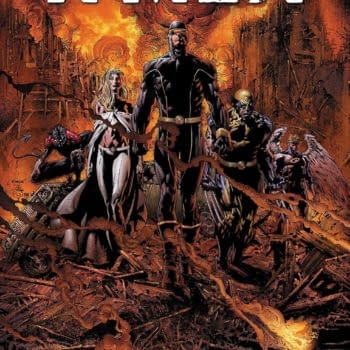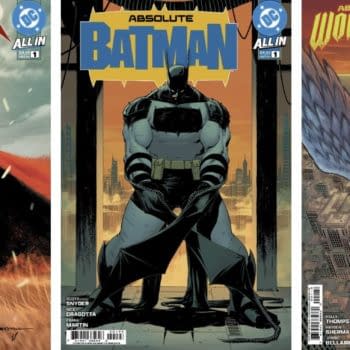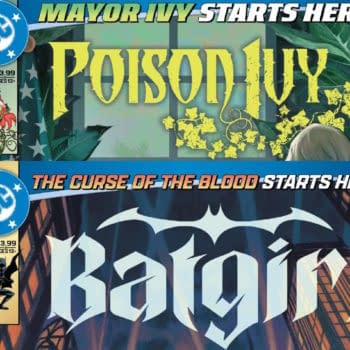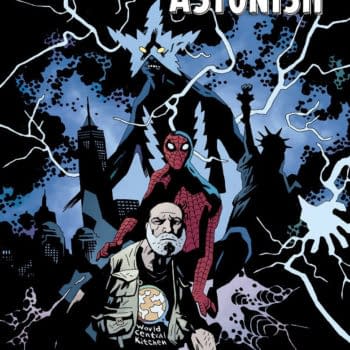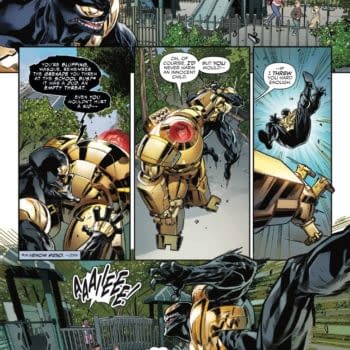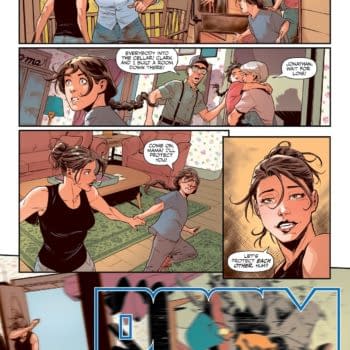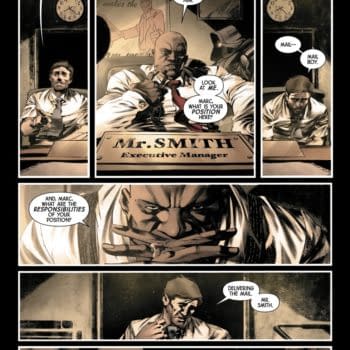Posted in: Comics | Tagged: cb cebulski, Comics, marvel
Piracy, Double Shipping, Multiple Artists And Buying Batman Noel For A Hundred Grand, The Unexpurgated CB Cebulski

That was only a tenth of it. The full interviews, posted by Corey Mintz, went even deeper in discussion with Chris Butcher of The Beguiling, Jen Agg of The Black Hoof and Roland Jean.
You should read the whole thing, but I cut and pasted some of Cebulski's statements and, frankly, breaking news.
From comics piracy being blamed on comic store workers (confirming something I've always believed) and the sites Marvel take to stop it, why comic artists aren't drawing comic runs any more, the Indonesian billionaire who bought Batman Noel and exactly why Marvel are upping their issue count, these kind of interviews should always be conducted with this much honesty.
On piracy:
Our comics are available for free online before they go on sale. The comic shops get their shipments on Tuesday so they can sort them out and have the store ready on Wednesday when they open. Someone is passing them off to their friends who are scanning them and then putting them online for free… We try to shut them down with a cease and desist and they just move to another server. You can track the number of illegal downloads every week on different sites. We see that certain books we're losing 15 to 25,000 copies a week, per title. So 25,000 X-Men, 25,000 Spider-Men … Our creators come in and complain about it and rightfully so. They're losing the royalties and the sales of those books. But what Chris just said. We wanna cut down on the piracy. But you have to understand that not all 25,000 of those people are going to pay for it, even if it's 99 cents. The argument we always have is, but they say, if it was even 10 to 25 percent, that's still 2,500 copies extra that we could be selling. We want to try to combat that but there's really no way to do it. We've tried. We actually worked with the same people who do money in the United States. There's a special ink where you cannot scan it. Since it doesn't have to be perfect like money, they found a way around it. They don't have to scan it. They can just take a hi-res photo of it and it comes out the exact same way. It's not perfect but they can still read the comic because that's all they're doing.
On portfolio reviews.
There are mentally disturbed people, yes, that I have done portfolio reviews of. There was this one kid, I remember, I wrote a story about it. He sat down and he was just: black Mohawk; dark make-up under his eyes; all the earrings; muscle guy; Misfits t-shirt with the sleeves cut off. And he had his portfolio and I open it up. And it's this most gory, violent story and it's clearly him, with an axe and a chainsaw, murdering this women and then burying her body and then getting away with it. And I was looking through it and I was like, oh, what is this. And he says, "Oh that's me killing my girlfriend." And I said, it's good that you can take your aggression and your pent-up feelings and transfer it into art and use that as an outlet. And he says, "Who says that really didn't happen. Maybe I wrote about what I actually did and that's a confession." And then he smiled. And it was still kind of evil and I didn't know if he was joking or not. So I was just like, well, you really need to work on your storytelling a little and your use of blacks.
Now we prescreen and put up a list that says we're going to meet with these twenty people.But there was this one where there were lines of people. There's usually three editors for review because the lines were so long. And at the back of the line you see this guy and he looked like Bootsy Collins.
He was like seven feet tall, he had the funky glasses, the big purple trench coat, the gaudy shirt, the headband. And with him he had a door. I mean, an actual door. And the door was as big as him. so he comes up and, luck of the draw, I get him. And he goes, "Here's my portfolio." He turns around the door and on the door is a collage that he had done of cutouts from sci-fi magazines and books with like the Millennium Falcon fighting the Enterprise, Luke Skywalker with Captain Picard. He had taken crayon and paints and done up star backgrounds and this total psychedelic stuff.I said, do you have anything else? He's like, "No. This is what I brought for review." I don't know what I'm supposed to say to this because he waited in line for like two hours. I just said sorry, this is not what we do. You engage them with their art. What medium did you use? Is this crayon? What was going through your mind at this point?
The way that we look at it now is that the production cycle of comics has changed. It used to be Romita, Kirby, Ditko, all those original guys. Comics came out monthly. They were fast enough. It was a job for them. It wasn't really art. They were getting a paycheck. And they would put out monthly books. It was on the newsstand. Now what's changed is, what sells a comic is not just the character, but it's the writer and the artist. The retailers are getting the Previews, which is three months in advance. They're able to place their orders on who wrote it, who drew it, what the storyline is. And because of that, because of the Image guys, basically, in the 90s, there's such a focus on the art and the artist, that they start taking more time with their art. So there's only a dozen guys, six guys from Marvel that I know of, that can do a monthly book. Everyone else, it takes them six to eight weeks to draw one comic book. We try to schedule two-issue arcs or three issue arcs and sometimes it works out and sometimes it doesn't. But there just really aren't guys who can do monthly comics anymore. They spend so much more time drawing. For them … and also another part of it is, when Kirby or Trimpe or these guys were doing it, there wasn't a big original art sales market. And they weren't really selling their originals for much. But now the artists know, they're getting their monthly page rate, which in some cases is quite substantial. So I was just talking to a guy the other day. I know that the rates are for some of these guys. Say a middle of the range artist, more popular, they get $300 to draw one page. So if they do a page a day they're making $300 a day, which isn't a bad living. But these guys, because of the art market, the more detail they put in, the more they can sell it for, they're going to take two days on a page or three days. To make it look like a piece of art that someone wants to hang in their house. The more detail they put into it, the more money they can sell it for. This guy I was just talking to, and he's more of an exception, but he spends about three days on a cover piece. And I don't know what his page rate is, but say it was $300. For a cover image you get plus 50%. So he'll make $450 off that cover. He spends three days on it. So that's $150 a day. But he turned around and sold that cover for $5000. So the time he put into it more than made up for the money he was losing by spending the time on it. And so some of these big guys like David Finch, Steve McNiven, any page that they produce, they can sell for easily over $1000…There's also the other side of what we do. Sometimes the artist thinks if they produce less, it makes them more in demand. Then they're going to sell more, their art's going to be worth more. And you've got some artists who put out monthly books, who put out fourteen issues a year, who are slaving over stuff. But they don't get as much respect as these guys because, 'Oh, we know what to expect from these guys. The book's always going to be on the stands.'
Some of the bigger names make much more in private sales. A lot of the guys we work with have guys, everything is presold. It doesn't matter what they do. They have a collect who says, whatever you do next, I'm gonna buy it.
There's a new guy, a collector from Indonesia, some billionaire real estate guy. He's just buying up everything. Like Lee Bermejo's Noel … He bought the whole book, from start to finish. 96-page graphic novel. Batman. I have no idea. He probably paid $100,000 for it at least.
It's taken for granted now that there's going to be, just like Amazing Spider-Man, there's three regular artists who do the book. With Daredevil there's going to be two… Steve is the editor. So Steve made the choice to go with Khoi Pham. And said he was going to work with Khoi to open up his style, make it a little looser. Tom Palmer's going to ink it, make it a little more open. So in that regard, the couple pages I've seen, Khoi has adapted his style to something more like that. But, that said, Koi's only going to be on for one issue. He's solicited for (issues 10.1 and 12 and 15). Chris Samnee's going to be coming on and taking over sooner. Him and Paolo will be the two regular artist's on the book for the rest of the year. We found, and part of the reason for this increased shipping, is that, there's a larger growing disparity between best-sellers and mid-sellers and low-sellers. There's good sellers and medium sellers but the lower sellers are selling lower, lower and dropping. And those were always miniseries or one-offs or things that don't count. And what we're finding now is that fans want things that are part of the continuity. They only want the main titles. They want Amazing Spider-Man, they don't want Avenging Spider-Man.The system that we're working with now is, we used to put out about 90 titles a month. Now we're doing about 70. But we're increasing the number of issues per title that we're putting out. As a fan it frustrates me definitely. For a lot of the editors, it's part of their job, it frustrates them. Because they're having to work with one writer with three separate artists at the exact same time. And the writer's being asked to write basically three series at the exact same time. In most of the cases the writer can keep up. Writers want to do multiple titles. But now you see they're focusing more on a couple core titles. Like Brubaker's only doing Cap and Winter Soldier. But now they're shipping more frequently. He'd like to do more but just can't find the time.






